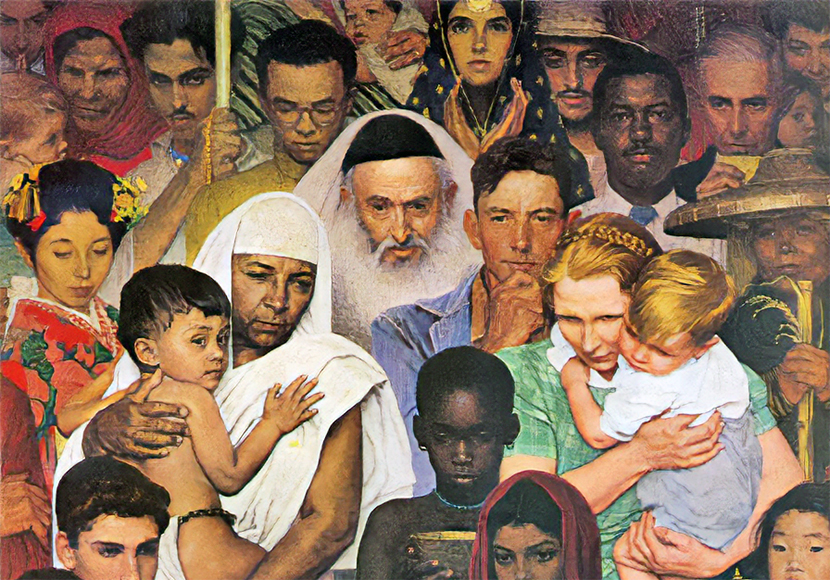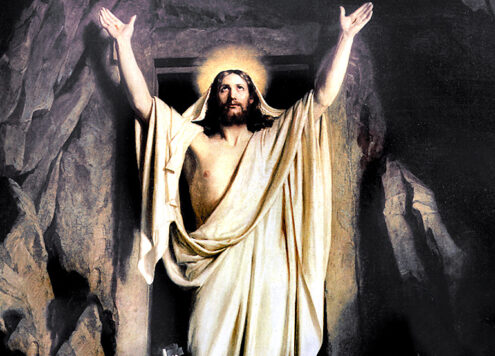Jesus makes an important statement in Matthew 22 about the rights of the State and the rights of God. He says, “Render to Caesar what belongs to Caesar, and to God what belongs to God.”
This statement was made in the context of Jesus’s reply to a question of the Pharisees about paying taxes to the Roman Empire, and acknowledges that people should be responsible to their civic duties while emphasizing they must also render their spiritual allegiance to God alone. This separation between civil and spiritual rights has become a hotly disputed topic in today’s American culture. Many Churches seem to be taking a more active part in politics whenever they view, as threatened, their religious tenets such as the sacredness of all human life, the protection of the environment, and the right to have their values taught and respected in public schools and institutions of learning.
The Bible insists that spirituality must mingle with the everyday lives we lead. Justice is a virtue and so it has a high place in religious teaching. But, it is also the foundation of any system of government and so belongs to the state, as well. The same is true of virtues like freedom, honesty, compassion, respect for others, and moral integrity. These spiritual and moral values which are found in religious denominations contribute to the welfare of the state for they contribute to the betterment of the individual citizen.
Jesus’ statement about the rights of the State (Caesar) and the rights of God does not divide reality into two separate spheres. There is only one reality, but it has different facets. This is why Jesus asks us to render to each responsibly, to respect both the law of the land and the law of God.
By saying that we must “give to Caesar what is Caesar’s” Jesus stresses the need to fulfill our obligations to each other in the political and social world. By asserting that we must “give to God what is God’s” Jesus emphasizes our spiritual and moral obligations which can only be satisfied by being faithful to our conscience and our religious tenets. Involvement in the political life of society and involvement in the life of Christ go hand in hand. You cannot have a good society without good individuals, and the sincere following Christ makes for better individuals in society.
Still, it is not easy to be a Christian in today’s society. The temptations are everywhere in our liberal, secular society that espouses and practices “freedoms” contrary to the gospel. As followers of Christ, we are called to give both the State and God what is theirs. But the Gospel does not give us a simple answer. Discovering what society needs, and realizing what God deserves can only happen with hard work. Jesus gives us the general rule in the gospel of Matthew with regard to our individual responsibility, but He does not address the specifics or the details because they are always changing, always challenging.
Being a good Christian requires a life of decision-making, a life of learning, and a life of fidelity to our Christian calling in this world. We are called to be the leaven of society, transforming it by our example as committed Christians. This is life at its best when we “render to Caesar what is Caesar’s and to God what is God’s.”
–Fr. Hugh Duffy











4 Comments
Brian & Leah Woolsey
I would like to be the first to sing the praises of this song. Thank you for your written homily, it definitely fits for today, Greetings from Minnesota!
Hugh Duffy
I agree with your remark about this beautiful hymn. The words, attributed to Saint Francis, go to the core of what it means to be a Christian, and the elevating music does it justice.
Thanks for commenting.
Bartholomew Okere
Fr. Duffy, your catechesis on today’s Matt’s gospel 22ff titled Civil & Spiritual Rights speaks volumes to the bane of our society. The conflict b/w Separation of Church & State here in the West & the demonization of Caesar & the way people cheat God than the Govt. You said it all from Christ’s answer to the group that tested him, “Render to Caesar what belongs to him & to God what is Gods” Tanx
Tom Rooney
Thank you Father Duffy ,already explanation as usual ,I’ll keep trying